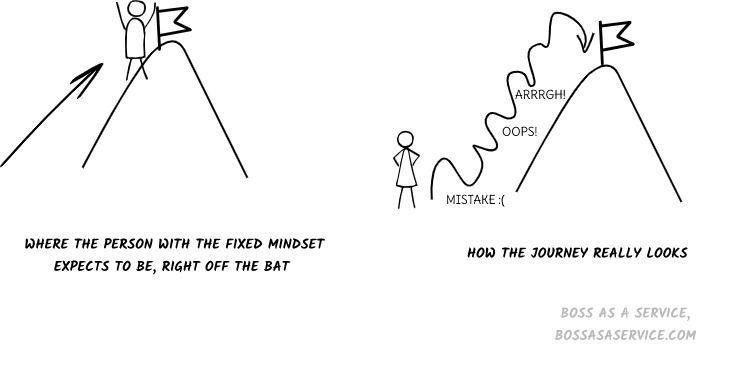Becoming is Better than Being
Forget about "being" something or someone, and start enjoying the process of becoming better. Carol Dweck's Mindset shows us how.
I love "personality" tests. I took the "Which Hogwarts house would you belong to?" quiz a lot growing up, and when I didn't get the result I wanted (Ravenclaw), I manipulated the answers and tried again.
Personality quizzes are fun to take. But the problem with them, beyond the debate about whether they're really scientific or even useful, is that they pigeonhole you. Like the Sorting Hat, they say, "this is what you are." Taking this to heart may be more dangerous than we realize.
That's what Carol Dweck's research, originally popularized in the book Mindset: The New Psychology of Success, focuses on. It delves into what she calls the "fixed mindset" and the "growth mindset."
What does it mean to have a growth mindset?
People who have a fixed mindset believe that qualities are carved in stone, immutable. Those with a growth mindset, on the other hand, believe that you can acquire skill, and get better at most things in life, with effort and practice.
In a fixed mindset, people believe you're either smart, or aren't.
You're "good at math" – or you just "don't have a head for numbers."
You're either "graceful by nature" or you're a klutz.
If you happen to "have two left feet" they see no hope for your dancing career. In fact, in their opinion, you should just give up and focus on something else. This is how they lead their lives, and this is the advice they give others.

In her work with children, Carol Dweck found that when presented with a puzzle, the children with a growth mindset would demand more challenging ones. After all, who wants to do the same puzzle over and over?
But that's exactly what the kids with the fixed mindset opted to do – solving the same puzzle again. They didn't want to even try the more difficult puzzle, because what if they fail? They would be deemed "not smart." Better not to try at all, and retain the status of being the "smart kid," rather than risk losing it by trying and possibly failing.
Spending time with fixed mindset people can be devastating for both your mental health and ambitions. They genuinely believe what they say, and with the sheer force of their confidence, manage to convince you of this limiting belief as well. It's even worse when it's someone whose opinion you value, like a teacher, boss or a mentor.
Growing up, I was told that I was "too creative to be good at programming." (What does that even mean?) Internalizing this limiting belief, I started repeating it myself, as if it were an unchangeable fact about me. Till I was well into my twenties, whenever I had an opportunity to learn to code, I'd say, "Oh, that's just not my thing."
I still have a little chip on my shoulder about that. But the truth is, we all have the fixed mindset in some or the other aspect of our lives. Maybe you're committed to learning and improving at work, but when it comes to social life, you've convinced yourself that you "aren't great with people."
The Fixed Mindset Focuses on Being rather than Becoming
"When do you feel smart: When you're flawless or when you're learning?" was Carol Dweck's question.
The people with the fixed mindset answered with variations of: "I feel smart when I don't make mistakes" or "When I solve a problem quickly and the solution is correct."
What we can see from these responses is that they want to be in a place where they're perfect. Competent enough to not make any mistakes. It's all about immediate perfection, getting to the end of the road – flawlessness – right away.
"The fixed mindset does not allow people the luxury of becoming. They have to already be." ― Carol S. Dweck, in Mindset.
The fixed mindset, at its core, is a status game, where image crafting and perception is the most important thing. Along with that comes a need for validation. It's about wanting to be seen as successful or smart. It's about being.
"In a fixed mindset, the cardinal rule is, look talented at all costs." ― Carol S. Dweck, in Mindset.
The way we use language makes our tendency to think in terms of "being" even worse. We often ask kids, "what do you want to be when you grow up?" Perhaps a better question might be, "What would you like to work on?" or "What would you like to spend your time doing?", thereby changing the focus to not what they'll be, but how they'll get there.
The Process of Becoming Involves Effort
Not only do we want to be at the finish line right away, we also want it effortlessly. Any indication that we've put in hard work would mean that we're not a natural. In fact, many of us actively hide the effort we've put in, and pretend like it all happened oh-so-easily, so we can be perceived as a natural by others.
Society seems to prize "effortless success" and being "naturally gifted" too, which may explain the number of movies made about geniuses. (This also seems to exist in other spheres – witness the weird obsession with effortless beauty.)
However, in reality, most things in life – learning a skill, achieving mastery in a field – all require not only effort, but invariably a long process of mistakes and several detours.

We all know the kid who coasted through school, getting good grades with little effort. Maybe it was you. Achieving early success due to talent may lead to a rude awakening later, when you realize that unless you develop your ability (and willingness) to work, there can be a limit to what innate talent alone can achieve.
Forget Outcomes and Enjoy the Process
In goal setting (and apparently everything else) we're much better off creating systems rather than goals.
Tracking input – your effort towards something – works much better than tracking results, especially since results are not always under our control. It's more effective to focus on the input goal of "going to the gym 5 days a week", rather than the output goal of "losing 10 pounds" or "getting to 10% bodyfat."
Once we stop focusing on "being" somewhere, and start thinking about what to do to get there, that's also when we start focusing on the right things – consistency, learning and deliberate practice.
“In the fixed mindset, everything is about the outcome. If you fail—or if you’re not the best—it’s all been wasted. The growth mindset allows people to value what they’re doing regardless of the outcome . They’re tackling problems, charting new courses, working on important issues. Maybe they haven’t found the cure for cancer, but the search was deeply meaningful.”
― Carol S. Dweck, in Mindset.
The journey of Becoming – watching ourselves getting better, slowly but surely – is really satisfying, if we open our minds to it. Solving a problem that would have stumped us a month ago is motivating. I highly recommend keeping a journal so you can occasionally go back and see the progress you've made. You're writing the story of Becoming who you want to be!
Final Thoughts
Once you're aware of the two mindsets, you start noticing when your thought runs down the same old neural pathways again. Do you find yourself shrinking from a challenge, preferring the safety of where you are? Do you notice a resistance in yourself to learn something new? In class, do you find yourself pretending to understand the material, even though you don't, because you don't want to be perceived as less smart?
Inculcating the growth mindset in yourself in itself is a process. (Hey, how meta!)
Go forth and Become.
Looking for more on mindset? Check out these articles!